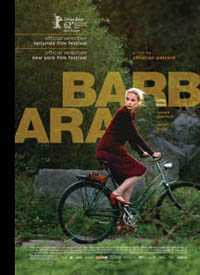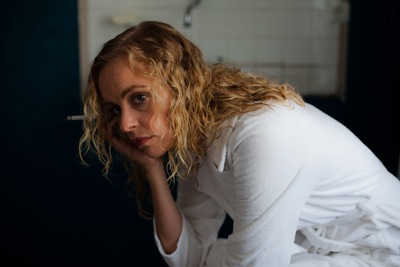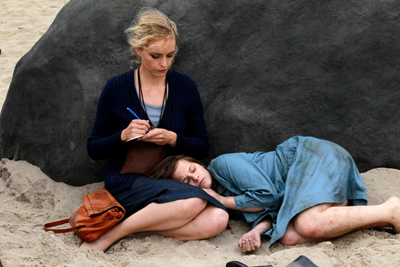
A razor-sharp cast and moody provincial cinematography don't quite hide the fact that Christian Petzold has remade
Casablanca here, but if you're going to riff on the best, do it daringly, with visual style and strong performances. Those are
Barbara's magic ingredients, creating a gripping Cold War-era, East Germany-based drama that's a magnetic portrait of human nature.
The bewitching Nina Hoss stars as the titular Dr. Barbara Wolff. It's her fifth starring role directed by Petzold but doesn't suffer from an easy familiarity. Barbara is the quietest electric person on the screen, compelling and dazzling without ever being open or glamorous. Barbara has been punitively reassigned to a small provincial hospital for her failed attempt to emigrate to the West; she's stalked and harassed (even molested) by the Stasi agents who take more pleasure in making her uncomfortable and paranoid than in doing their job (Rainer Bock is sensational as the beastly GDS agent Scütz). Barbara has another plan to escape to the west with the help of her rather bland lover (Mark Waschke succeeds in the difficult task of making a sympathetic character appear distant). She's torn, however, with a beautiful irony: the life and the people of her new country are more vivid, empathetic...more
human...than what she hopes to escape to. None of this is clear from the start, nor does any one character ever spell out the plot. It's an intelligent puzzler, a puzzle box of intrigue and changing allegiances, Barbara's dilemma as heavy as the mighty winds that buffet the East German countryside as she bikes to and from the hospital and illicit rendezvous with her boyfriend.

Complicating matters is the traditional good-guy third of the love triangle, her mysterious and compassionate medical colleague Andre (Ronald Zehrfeld, in a fuzzy beard that hides his subtle facial expressions). Andre has the difficult task of tilting the balance for Barbara, but Zehrfeld plays it so low-key that we're never certain if his affection for her is genuine or just another false front. To Zehrfeld's credit, this doubt plays out exceptionally in a scene where he explains why he too has been banished to the hospital in the hinterlands; we—and Barbara—are never quite certain if he's telling the truth. Everyone is wearing masks. It's dangerous to let them slip.

Despite the driving force of Nina Hass's performance, an energy kept in check by her need to remain distant from all that surrounds her, this is no edge-of-your-seat, nail-biting thriller. It lags substantially in the middle section and some scenes, such as an illicit meeting in a hotel with Jörg, Barbara's lover, seem to be in the script simply to Make. One. Point. And if you didn't catch it, we focus tightly on Barbara's seemingly impassible face, reminding you to consider what has just been said. But then it is immediately followed with a delightfully fanciful scene in which Barbara encounters Steffi, a young prostitute—the sex partner of Jörg's partner—who's been promised the same reward of a life in the West. She giggles and drinks champagne and shows Barbara the catalogue from which she'll pick out her gaudy engagement ring. Steffi (Susanne Bormann) is only on screen for a few moments, giving the most emotionally open and joyful performance in the film. She's the only character filled with true optimism over the future, even though we and Barbara know she's destined to be disappointed. It's a blip in an otherwise slow section of the film but an important and startling one.
There's other dramatic moments that plunge into seemingly unbelievable coincidence or improvident editing: Stasi agent Scütz is harboring a secret that, of all the people in her small town, suddenly pushes Barbara to her eventual conclusion. A runaway girl that bonds to Barbara escapes her hellish work camp life, immediately followed a scene that gives away (to anyone who's ever seen a movie before, at least) the movie's eventual final plot twist. But all these scenes are illuminated by canny performances that divert attention from any weaknesses in the script.

Yes, in the end it's the same general plot as
Casablanca, with the problems of two people not amounting to a hill of beans. The right person gets the prize of freedom, and for those left behind, it's the beginning of a beautiful friendship, albeit one without a kiss that's still a kiss. At least, not now.
Barbara reminds you that while there are few new stories still left to be told on screen, there are dynamic and electrifying ways to retell them. That the behavior, actions, reactions, and decisions of the characters both good and bad are immediately identifiable as small but human are the credit to Christian Petzold and his cast. Intelligent and incisively filmed, Petzold brings the human condition alive in Nina Hass, with vibrancy and beauty.
 A razor-sharp cast and moody provincial cinematography don't quite hide the fact that Christian Petzold has remade Casablanca here, but if you're going to riff on the best, do it daringly, with visual style and strong performances. Those are Barbara's magic ingredients, creating a gripping Cold War-era, East Germany-based drama that's a magnetic portrait of human nature.
A razor-sharp cast and moody provincial cinematography don't quite hide the fact that Christian Petzold has remade Casablanca here, but if you're going to riff on the best, do it daringly, with visual style and strong performances. Those are Barbara's magic ingredients, creating a gripping Cold War-era, East Germany-based drama that's a magnetic portrait of human nature. 


No comments:
Post a Comment